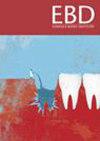Can we rely on delaying the uptake of sugar consumption in the prevention of early childhood caries?
Q3 Dentistry
引用次数: 0
Abstract
Feldens C A, de Barros Coelho E M R, Vítolo M R, Rogrigues P H, Kramer P F, Peres K G Effectiveness of a sugar consumption prevention programme in the first year of life on the occurrence of early childhood caries: a multicentric randomized trial in Brazil. Caries Res 2024; https://doi.org/10.1159/000541028 . A multi-centre randomised controlled trial was carried out in Brazil. The intervention group received nutritional counselling based on dietary guidelines produced by UNICEF. The control group received standard dietary and maternal counselling provided by the hospital provider. Randomisation of participants was completed through a computer-based system with an investigator blinded to the recruitment process. Patients were followed up monthly using a combination of phone calls and home visits. Pregnant women were recruited from four hospitals, across three state capitals, participating in the Baby Friendly Hospital Initiative. Mothers were to be at least 18 years of age, testing negative for HIV/HTLV1, and had an uncomplicated pregnancy. Their newborns had to have a gestational age of more than 37 weeks and weigh more than 2.5 kg. A newborn with increased hospital stays due to infection or neonatal conditions which affected breastfeeding were not included. Sample size calculation was undertaken. Baseline data was collected. At 6- and 12-month intervals, a combination of validated questionnaires, including 24-hour recalls, and interviews were used to assess the diet. Oral health assessments were carried out by a blinded, trained and calibrated paediatric dentist. The primary outcome was a reduction in ECC. Effect measures (relative risk [RR]) were calculated to determine the effect of the intervention on not consuming sugar at 6 months and on the mean number of sugary items consumed at 12 months. Baseline demographic data were similar, with no significant differences noted, between the intervention and control groups. The probability of not consuming sugar in the first 6-months was 2.4 times less in the intervention group relative to the control group (p = 0.016). ECC was diagnosed in 17.4% of the whole sample; however, no significant difference was noted between groups at any time point (p = 0.281). Increased intervention to the mother in the first 6-months of life was effective at reducing the amount of sugar intake. However, this did not lead to a statistically significant reduction in ECC.在预防儿童早期龋齿方面,我们是否可以依靠推迟糖的摄入量?
本文章由计算机程序翻译,如有差异,请以英文原文为准。
求助全文
约1分钟内获得全文
求助全文
来源期刊

Evidence-based dentistry
Dentistry-Dentistry (all)
CiteScore
2.50
自引率
0.00%
发文量
77
期刊介绍:
Evidence-Based Dentistry delivers the best available evidence on the latest developments in oral health. We evaluate the evidence and provide guidance concerning the value of the author''s conclusions. We keep dentistry up to date with new approaches, exploring a wide range of the latest developments through an accessible expert commentary. Original papers and relevant publications are condensed into digestible summaries, drawing attention to the current methods and findings. We are a central resource for the most cutting edge and relevant issues concerning the evidence-based approach in dentistry today. Evidence-Based Dentistry is published by Springer Nature on behalf of the British Dental Association.
 求助内容:
求助内容: 应助结果提醒方式:
应助结果提醒方式:


